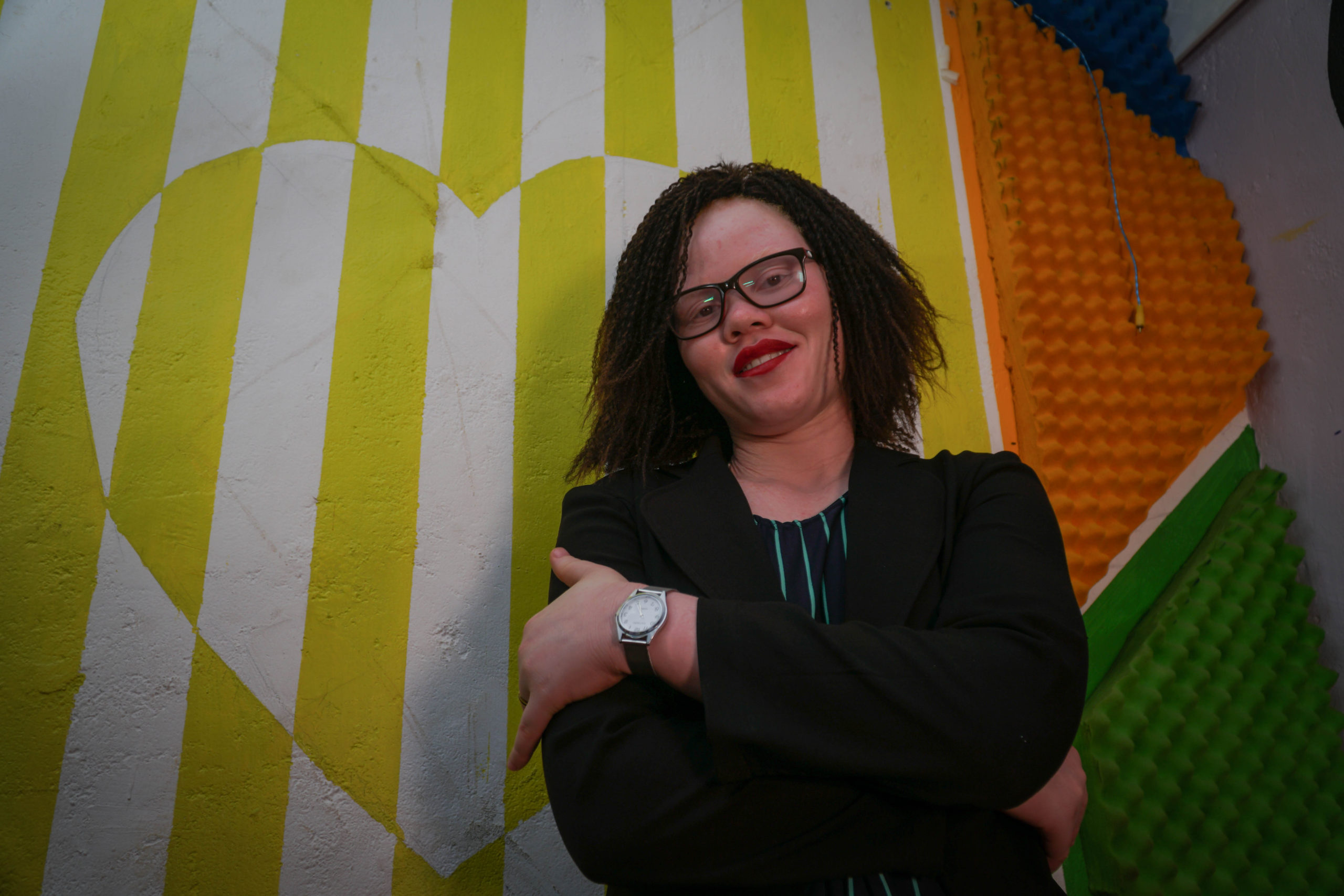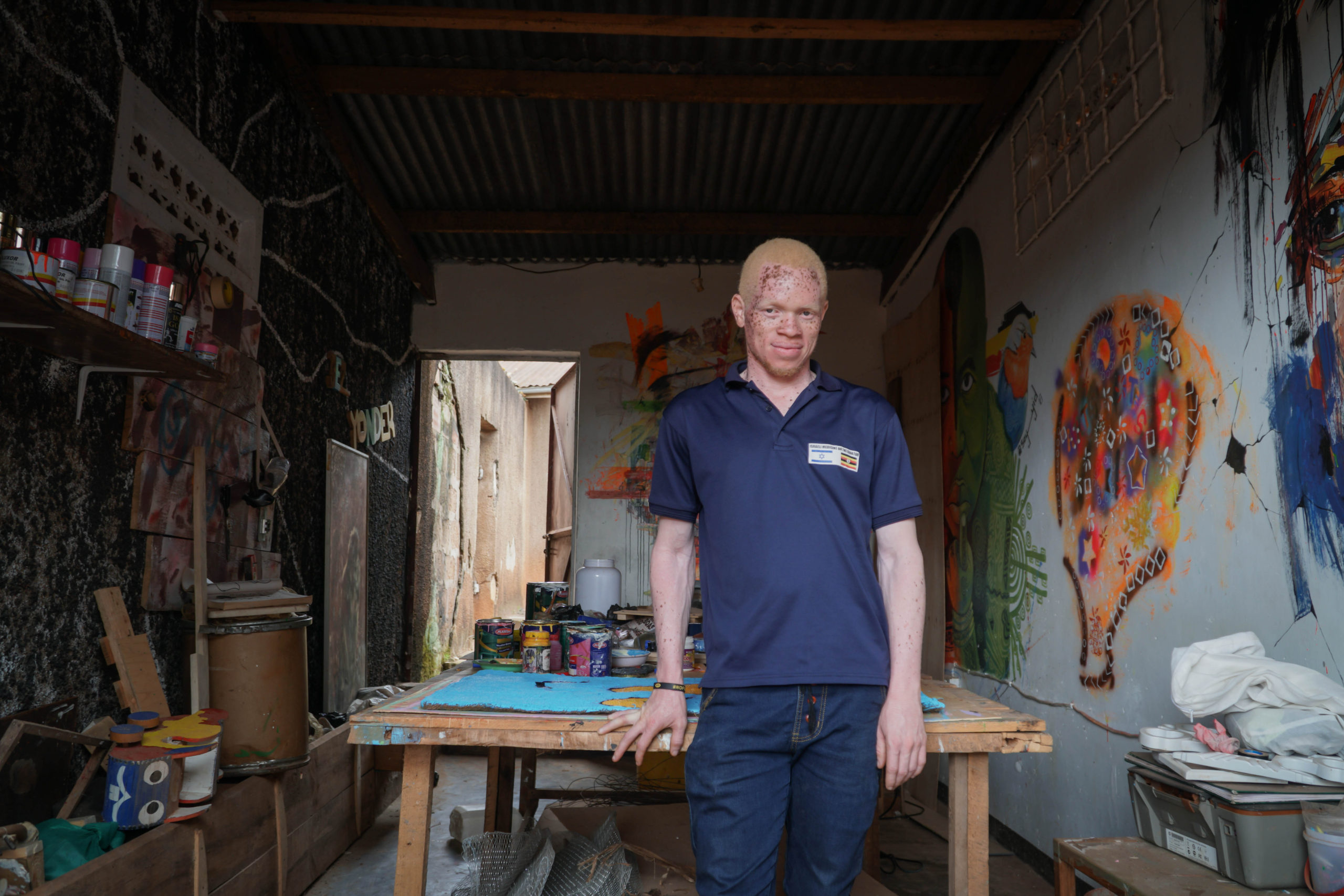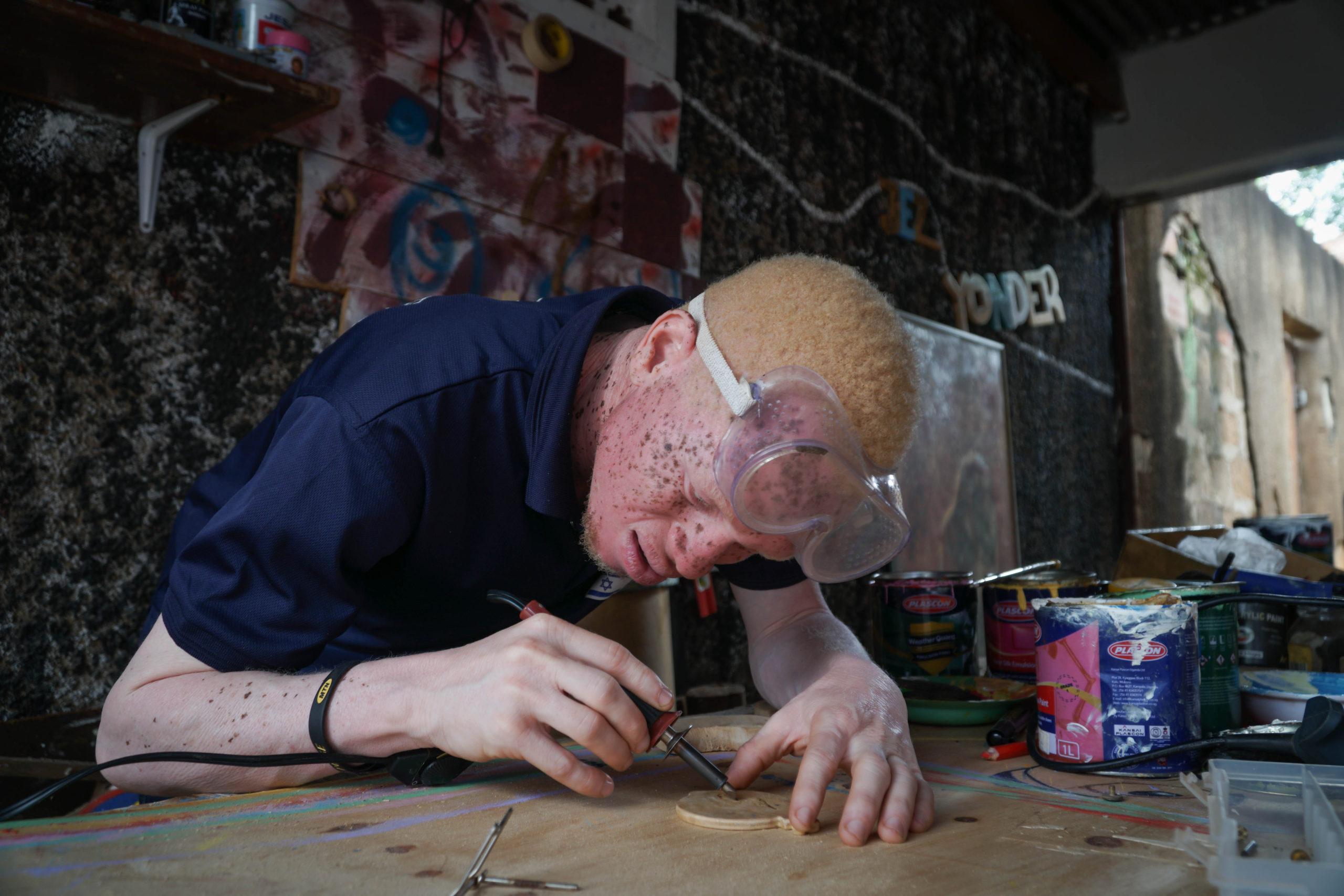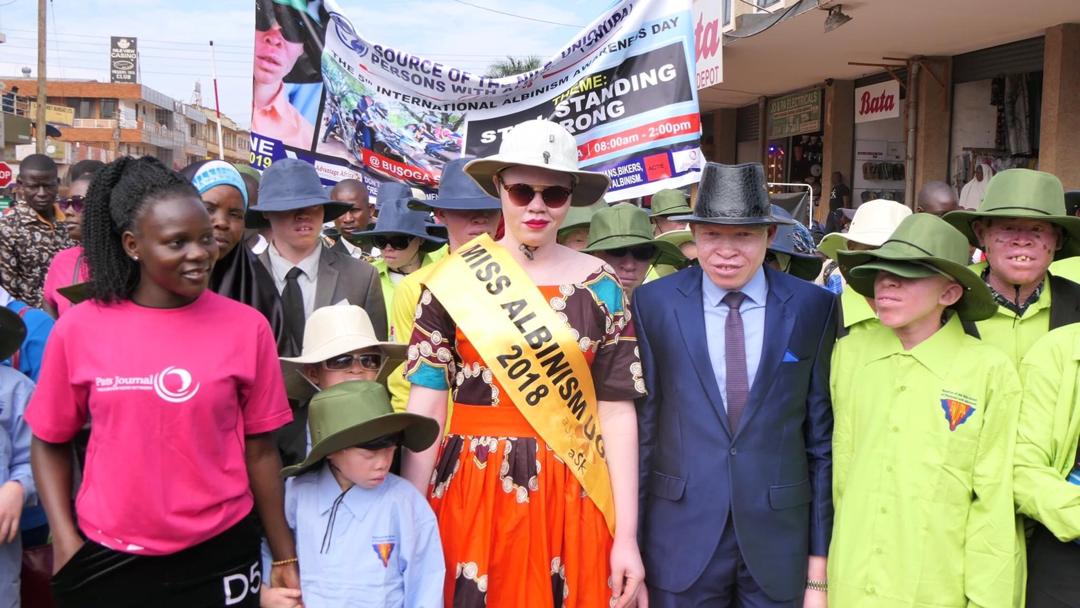Kampala, Uganda (Minority Africa) — At nine years old, Olive Auma was returning home from school in Abim, a district in northern Uganda when she was stopped by five herdsmen who ordered her to take off her clothes and lay down or face dire consequences.
“With no one to call for help, I stood in shock waiting for whatever was to happen when I heard a woman shouting at them to leave me alone or their cows would instantly vanish,” she says.
The men let her be. Yet for how traumatic this incident was, it was not the first time it occurred and it wasn’t the last either.
Growing up in a community ridden with ignorance and superstition, Auma bore the crux of albinism; a crux that comprised multiple rape attempts and what she describes as a never-ending stigma.
She was born in Abim district as the only child with albinism into a family of six and with them as her support system, she learned to grow a thick skin at a very young age.
“It wasn’t easy,” she tells Minority Africa. “But it didn’t mean one had to give up.”
Now at 25, Auma works as a dental assistant in Moroto district and is the current holder of the Miss Albinism Uganda pageantry title, an improvement from the little scared girl surrounded by brutes.
The pageant dubbed “Beauty beyond the Skin” was organised by Source of the Nile Union of Persons with Albinism (SNUPA) in partnership with the Albinism Society of Kenya, with an objective to create awareness for skin cancer among persons with albinism, educate them about their rights, as well as foster capacity development.

For Auma, the contest was a way to inspire others like her.
“I knew I had to carry the responsibility of awareness creation, fighting the myths and misconceptions about persons with albinism,” she says.
Yet in this fight, she is not alone.
Paul Wakibona, a 26-year-old who works as a programme coordinator with the Kiboga Disabled Persons Union is currently Mr. Albinism Uganda. Unlike Auma, Wakibona says he was raised in a supportive community where many loved and cared for him.
“It wasn’t that difficult for me since my family and friends supported me along the way,” he says.
Being crowned Mr. Albinism was a platform for Wakibona to challenge the stigma against persons with albinism.
“I saw it as a chance that I’m going to use to speak and reach different communities with a title because I could be easily recognized,” he says. “People with albinism have the potential to do great things if not discriminated against; there are beautiful things we can do regardless of our skin colour.”
Although the pageant was the first of its kind in Uganda, the organizers say the event attracted contestants from different fields including lawyers, administrators, teachers, health professionals as well as students who had to compete to qualify for the regional pageant, “Mr & Miss Albinism East Africa” that was to take place in Kenya later in November 2018.
“We intended to bring on board persons with albinism, showcase their abilities and get them to appreciate themselves as beautiful people,” Peter Ogik, the chairperson of SNUPA tells Minority Africa.
And it seems to have worked.
“I remember, the image that we left in Nairobi, the image that we brought in East Africa, changed people’s perspectives towards us,” Wakibona says. “They used to look at us like people who can’t do anything, people who are supposed to be, you know, humble, they can’t do anything, they don’t have energy, they can’t smile.”
“Painful deaths from skin cancer”
Albinism is a non-contagious genetically inherited condition that affects 1 in 20,000 persons worldwide. It results from a significant deficit in the production of melanin and is characterised by the partial or complete absence of pigment in the skin, hair, and eyes.
While it occurs globally across all gender, racial and ethnic groups, in Sub Saharan Africa, the condition is four to five times more prevalent than the rest of the world, affecting about 1 in 5000 to 15000 people with specific countries like Tanzania [1 in 1400] and Zimbabwe [1 in 1000] having a much higher tendency.
In some countries, a majority of persons with albinism die from skin cancer between thirty to forty years, with high prevalence in Africa where exposure to the sun is almost unavoidable.
This is primarily due to the absence of melanin that protects the skin against the harmful effects of the sun in persons with albinism making them more susceptible to ultraviolet radiation thereby increasing the likelihood of having skin cancer.

Henry Manson Ngobi, a dermatologist who closely works and treats persons with albinism in Jinja, Uganda says that most skin cancers appear first as lesions before manifesting into cancer itself and can be treated if detected early.
“When we detect early enough, we can do cryotherapy,” Dr. Ngobi tells Minority Africa. “But when it manifests as cancer, we excise the minor cases and refer the complicated ones to plastic surgeons.”
He, however, adds that skin cancer besides being a problem of its own is coupled with ignorance where sick persons have no knowledge of how and where to access treatment or of the ways to protect their skin from sunburns.
“Before SNUPA came in, they were in villages hiding with no treatment, no sunscreen protection creams, and couldn’t even protect their skins,” he says.
His sentiment on the necessity of pageants like these is echoed by Auma and Ogik.
“If you don’t teach a person with albinism how to take care of their skin, like the need to put on long-sleeved clothes, they will be wiped out,” Auma says with concern in her voice that is reflected in Ogik’s as well.
“I have seen painful deaths of my colleagues dying from [skin] cancer and it scares me,” he says. “Having to watch your skin eaten up by cancer while your heart still beats is unimaginable.”
The pageant organizers succeeded the contest with an awareness campaign themed “Fighting skin cancer,” and targeted at persons with albinism in Uganda.
“Skin cancer affects their quality of life, reduces their life span, increases stigmatization, and to top it all is very expensive to treat.” Dr. Ngobi says.
In several countries in sub-Saharan Africa, misconceptions shrouded in myths and superstition have resulted in serious violations of the human rights of persons with albinism.
They have been subjected to various forms of discrimination, cutting of their body parts, and amputation of limbs due to the belief that they possess magical powers and can be a source of wealth; they are tortured and sometimes even murdered.

Nicholas Opiyo, a human rights lawyer and founder of Chapter Four Uganda, an organization working to influence laws and policies in the interest of human rights, explains that while the constitution of Uganda doesn’t specifically mention persons with albinism, it is understood that the general protection of rights to life includes their protection.
“These legal provisions have not been liberally applied to protect the rights of persons with albinism,” he says in a written comment to Minority Africa. “Mainstream human rights advocacy has relegated the issues of the rights of persons with albinism to the periphery, if not to an unimportant matter.”
Opiyo adds that this is both regrettable and shameful.
“To change this, we ought to start by highlighting the plight of the group, humanising them, and pushing against cultural and social rejection,” he says.
Cultural and social rejection are two things Auma and Wakibona admit they have to fight against every day.
“You can’t hide away from the fact that you’re a person with albinism,” Auma says explaining how she’s been able to combat this rejection. “Within you, you should accept yourself for who you are and never regret it.”
She attributes some of her strength as coming from her Muslim faith, a religion she converted to from Christianity five years ago.
“I love my religion,” she says. “The world sees it as some backward religion because of the wrappings, the decent clothes, and everything one wears but I see that as a way of maintaining a woman’s dignity.”
Since 2010, there have been around 700 attacks and killings of persons with albinism in around twenty-eight countries. However, because the violence often occurs in clandestine rituals in rural areas, many of these cases are never reported, and these culprits are never brought to justice.
For Wakibona, art has been instrumental in changing people’s perceptions of himself.
“I wasn’t good at art at the beginning, but I became passionate about it,” he says. “When I’m doing it, some people come in [and say], ‘I didn’t know you could do that.’ Through this we can communicate, [can become] friends, something of that kind.”
Some activists have criticized and called for the amendment of the current cancer policy championed by the Ugandan government to fight skin cancer because the policy, they say, is discriminatory and does not mention the particular cancers that attack persons with albinism.
They have also decried the absence of dermatologists at government health facilities. Uganda has an estimated number of 20 dermatologists to serve its population of about 44 million and to access skin cancer treatment, an inquiry has to be put in first to the hospital for approval, with only a limited number approved for treatment on a specified day.
“There is only one facility with a few doctors at Mulago hospital where skin cancer treatment can be attained and as such, they are overwhelmed by the number of patients,” Dr. Ngobi says. “Many of them end up dying along the way if not given urgent attention.”
Activism
Since winning Mr and Miss Albinism Uganda, Auma and Wakibona have acted as flag bearers championing advocacy campaigns in different communities across the country together with the SNUPA team.
These campaigns provide free cancer screening and treatment for those diagnosed alongside other necessities such as sunscreen lotions, spectacles, long-sleeved clothes, and wide brim hats.
In like manner, sensitization of persons with albinism together with their families and the community at large through continuous health education is done as a way of creating awareness for the condition.
“Getting to love yourself doesn’t come easy [and] one needs a supportive family to always confide in when everyone else is pointing fingers,” Auma says. “This is why sensitising families especially those in which children with albinism live is crucial.”
One of the major achievements of the campaign has been the government’s removal of taxes on sunscreen products but Ogik says, “It still isn’t enough.”
He implores the government to provide free sun-screen lotions because even without taxes, these lotions are still very expensive and cannot be afforded by most of the people who need them.
There have been other wins as well. In some districts, including Isingiro, Mbale, and Buliisa where campaign activities have been held, Ogik says skin cancer cases among persons with albinism have reduced, “to about 70% especially in the Busoga sub-region where the campaign is most active.”
This, he attributes to the frequent skin cancer screening done every quarter of the year.
Additionally, about 200 children have been provided with scholastic material whereas about 80 teachers from various schools have been trained on how to handle children with albinism so as to enhance their learning process.
“When a teacher is aware that a child with albinism is short-sighted, then he knows that the child needs to sit at the front of the class,” he says. “And [the teacher] is supposed to use large prints while writing on the blackboard.”

The campaign through negotiations with some school owners has succeeded in convincing schools to make provision for children living with albinism to have long-sleeved uniforms and wide brim hats for their safety.
In a similar way, they are working closely with various organisations to link persons with albinism to diverse employment opportunities according to their capabilities. As such, many of the contestants of the pageant have been enrolled as professional models in different modeling agencies, including the Malengo Foundation.
Despite the successes of the campaign, a number of challenges slow down the process, one of them being limited knowledge about albinism by persons with albinism themselves.
“It is sad that some of the persons with albinism are not aware of their condition until it is too late,” Wakibona says. “If we are united, people with albinism, we can have a big voice, you understand?”
And although some communities have become more responsive as a result of the awareness of the campaign, there remains a considerable fear of stigma.
“Some people still keep [persons with albinism] indoors due to shame, denying them of a normal life, “Auma says. “This makes them hard to get to.”
Ogik acknowledges these challenges but nonetheless foresees the pageant as a platform that will address issues of persons with albinism across the globe. He wants to ensure more persons with albinism partake in national beauty pageants including Miss Uganda and Miss Tourism, a vision he knows can only be possible with the required financial backing.
“I believe we as persons with albinism are beautiful and worthy of anything we desire,” he says. “I know change cannot be made in one day but then I am confident that there is hope, I believe tomorrow will be better.”
Auma and Wakibona seem to share this belief as well. While Auma dreams of owning an organization working towards the rights of marginalized groups, Wakibona envisions a world where people like him are able to lead a productive life.
With a dreamy gaze as though staring into the desirable future itself, he says, “We still have a long way to go but we’ll get there someday.”






